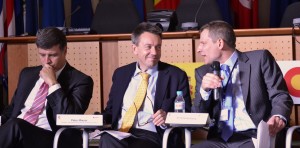November 6, 2013

Manuel Sanchez-Montero (AECID), Peter Maurer (ICRC President) and Ed Schenkenberg (DARA Chief Executive)
The Spanish Agency for International Development Cooperation (AECID) and DARA held the second humanitarian effectiveness HardTalk dialogue with Peter Maurer, President of the International Committee of the Red Cross, November 5th. View summary of first HardTalk with Valerie Amos
The humanitarian community has grown exponentially in the last two decades. This growing number of organisations should imply a greater capacity of the sector to deliver humanitarian response to populations affected by armed conflict, but has this really been the case? Responding to the needs of people in places that are more difficult to access clearly has security implications for operations, but the needs of civilian populations caught in conflict are just as urgent. They need assistance and protection. Strong adherence to humanitarian principles is essential to be present and deliver.
Issues related to the effectiveness of humanitarian action raised during the discussion included:
- Presence: proximity to affected populations in conflict zones as being essential for humanitarian action to be effective, since presence allows acting on real needs assessments instead of perceptions.
- Adhering to the framework of International Humanitarian Law, instead of advocating for the Human Rights Agenda, as a path to improving aid effectiveness. IHL allows balancing military necessity and the protection and assistance to civilians, as well as negotiating with those in control of territories to reach practical agreements that will open up access to populations in need. A Human Rights Agenda may be too aspirational and may be rejected by parties in conflict situations and thus not as effective as IHL in ensuring access to affected populations and the security of humanitarian staff, especially when confronted with stark realities on the ground. In Syria for instance, the lack of a commonly accepted legal framework by the international community has resulted in a free-for-all operating environment where principled humanitarian action receives little support, and humanitarian actors cannot deliver much needed assistance.
- Real or abstract numbers: the system’s different approaches to putting together and backing financial appeals. There is a dilemma between calling for sums of money that can actually be spent, and requesting overblown figures to garner political support, attention and cover abstract needs. The latter does not necessarily guarantee effectiveness since i) donor governments, aware of the inability of the system to cover the abstract needs of all affected populations, do not disburse full requested amount or ii) they do provide funds, and these are too abundant for what was initially intended and insufficient for what is actually needed: access on the ground, protection and capacity building.
- Separating humanitarian action from other agendas, especially in politically contested areas where there is a need for clear agendas, concepts and humanitarian space. A blurring of agendas and language is confusing and ultimately damages humanitarian action.
- Working with and respecting state sovereignty, in order to open up entry points to guarantee access and security in countries like Yemen, Myanmar, Sri Lanka and Sudan.
The final HardTalk Event will take place with Claus Sorensen, Director General of ECHO’s Humanitarian Aid and Civil Protection Department (14 Nov).
View HardTalk programme
Event photos
[flickr-gallery mode=”photoset” photoset=”72157637378621054/” pagination=1]
Share this